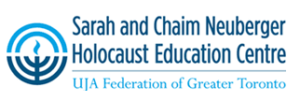37th Annual Neuberger Holocaust Education Week: November 2-9, 2017
PIVOTAL MOMENTS
Holocaust Education Week 2017 examines the post-Holocaust period, and the specific events that have shaped our understanding of the Holocaust. These events stand out as moments of such magnitude that they have dramatically altered the way in which we conceptualise, depict and even talk about the Holocaust. They cross a multitude of disciplines such as cultural productions, cinema and film, literature, history and many others. These moments also differ from one region to another. The programs during HEW 2017 will unpack these pivotal moments and ask why these are “the moments” and what else has been overlooked in shaping our understanding of the Holocaust.
In the aftermath of liberation, these “Pivotal Moments” have forever changed the way in which we understand the Holocaust. While these pivotal moments are all relegated to the past; HEW 2017 will also examine new developments in technology, science, and culture taking place today that will determine how we remember the Holocaust in the future.
Similarly, HEW 2017 seeks to examine how contemporary audiences have come to their understanding of the Holocaust even by challenging the theory that pivotal moments are all encompassing in effect. For example, although the Eichmann Trial was undoubtedly a watershed moment in postwar history, we know that Holocaust survivors spoke of their experiences, testimony was collected, and archival holdings established long before the trial. What the trial did do, was put the concept of justice, of the Holocaust, and of Nazi war crimes on a global stage – for the world to see via television and this dramatically shaped our understanding.
During Holocaust Education Week 2017, the Neuberger will focus its curated programs on the following areas. Community venues are invited to develop programs that address these and identify and examine others:
- Testimony: David Boder’s recordings in DP camps, the televised testimonies of Holocaust survivors at the Eichmann trial, combating Holocaust denial – the personal testimony of Holocaust survivors continues to inform generations about the Holocaust.
- Transitional Justice: Moments such as the Nuremberg Trials, Auschwitz Trials, Mauthausen Trials, Eichmann Trial and the establishment of the International Criminal Court. These events have shaped our understanding of justice and the Holocaust.
- Social Media, Technology, and the Internet: The internet and Social Media have made Holocaust narratives more accessible than ever before while also giving rise to Holocaust denial. Educational technologies like New Dimensions in Testimony, Virtual Reality programs and computer software influence how we will talk about the Holocaust in the future.
- Cinema and Film: Schindler’s List, the Pianist, Shoah, Holocaust the TV Series – films that demonstrate how the Holocaust is depicted in popular culture
- Literary: Elie Wiesel’s Night, The Diary of Anne Frank, Primo Levi ‘s Survival in Auschwitz, and Viktor Frankl ‘s Man’s Search for Meaning , are just some of the books that have influenced depictions of the Holocaust in the literary imagination.
- Reparations/Provenance/Restitution: The Claims Conference, Max Stern Restitution Project, and the French State Rail co. are a few examples of attempts to recover material losses. How countries and corporations have come to terms with their involvement in the Holocaust.
- Music, Theatre, Museumification, Art & Cultural Productions: Each generation has interpreted the Holocaust through artistic productions and representations. Performance pieces such as Defiant Requiem, Who Will Carry the Word?, and Playing for Time continue to impact audiences while museums institutionalize Holocaust memory and curate narratives.
HEW IN THE PRESS
Click here to see our coverage.
 Support Holocaust Education Week 2017
Support Holocaust Education Week 2017